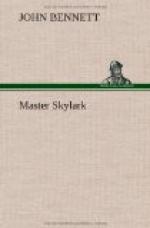“Pshaw! no,” said Nick; “none of those old-fashioned things. These be players from London town, and I hope they’ll play a right good English history-play, like ‘The Famous Victories of Henry Fift,’ to turn a fellow’s legs all goose-flesh!”
Hodge stopped short in the road. “La!” said he, “I’ll go no furder if they turn me to a goose. I wunnot be turned goose, Nick Attwood—an’ a plague on all witches, says I!”
“Oh, pshaw!” laughed Nick; “come on. No witch in the world could turn thee bigger goose than thou art now. Come along wi’ thee; there be no witches there at all.”
“Art sure thou ’rt not bedaffing me?” hesitated Hodge. “Good, then; I be na feared. Art sure there be no witches?”
“Why,” said Nick, “would Master Burgess John Shakspere leave his son Will to do with witches?”
“I dunno,” faltered Hodge; “a told Muster Robin Bowles it was na right to drownd ’em in the river.”
Nick hesitated. “Maybe it kills the fish,” said he; “and Master Will Shakspere always liked to fish. But they burn witches in London, Hodge, and he has na put a stop to it—and he’s a great man in London town.”
Hodge came on a little way, shaking his head like an old sheep in a corner. “Wully Shaxper a great man?” said he. “Why, a’s name be cut on the old beech-tree up Snitterfield lane, where’s uncle Henry Shaxper lives, an’ ‘tis but poorly done. I could do better wi’ my own whittle.”
“Ay, Hodge,” cried Nick; “and that’s about all thou canst do. Dost think that a man’s greatness hangs on so little a thing as his sleight of hand at cutting his name on a tree?”
“Wull, maybe; maybe not; but if a be a great man, Nick Attwood, a might do a little thing passing well—so there, now!”
Nick pondered for a moment. “I do na know,” said he, slowly; “heaps of men can do the little things, but parlous few the big. So some one must be bigging it, or folks would all sing very small. And he doeth the big most beautiful, they say. They call him the Swan of Avon.”
“Avon swans be mostly geese,” said Hodge, vacantly.
“Now, look ’e here, Hodge Dawson, don’t thou be calling Master Will Shakspere goose. He married my own mother’s cousin, and I will na have it.”
“La, now,” drawled Hodge, staring, “’tis nowt to me. Thy Muster Wully Shaxper may be all the long-necked fowls in Warrickshire for all I care. And, anyway, I’d like to know, Nick Attwood, since when hath a been ’Muster Shaxper’—that ne’er-do-well, play-actoring fellow?”
“Ne’er-do-well? It is na so. When he was here last summer he was bravely dressed, and had a heap of good gold nobles in his purse. And he gave Rick Hawkins, that’s blind of an eye, a shilling for only holding his horse.”
“Oh, ay,” drawled Hodge; “a fool and a’s money be soon parted.”
“Will Shakspere is no fool,” declared Nick, hotly. “He’s made a peck o’ money there in London town, and ’s going to buy the Great House in Chapel lane, and come back here to live.”




